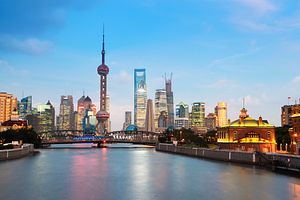In his 2013 bestseller Capital in the Twenty-First Century, which examines economic inequality in the West since the 1700s and argues things are only likely to get worse, French economist Thomas Piketty dismisses Western fears of Chinese power and argues that despite difficulties, China’s economic future is full of promise.
Piketty considers fears that China will unseat the West “pure fantasy”, and says China isn’t even remotely close, pointing out that the total assets of Chinese sovereign wealth funds, including the reserves of the Bank of China, are a mere 5 percent of the total real estate and financial assets net of debt owned by European households. He feels the main reason for such fears has to do with a “loss of democratic sovereignty” resulting from state fragmentation, heightening market competition by creating new economic entities. And while he criticizes Beijing’s efforts to control Chinese society, he is wary of hypocrisy when it comes to Western perspectives on the matter, reminding readers that the U.S. still has the highest incarceration rate in the world (after Seychelles) and continues to use food stamps to control public use of federal aid in a manner “inconsistent with the liberal worldview often attributed to U.S. citizens.”
Moreover, Piketty argues, the restraints are not all that bad. He explains that when China and India liberalized their economies, beginning in 1978 with Deng Xiaoping and 1991 with P.V. Narasimha Rao, both nations experienced an increase in private capital and inequality. But from the mid-1980s to 2010, India’s wealthiest one percentile went from holding 6 percent of the nation’s income to roughly 13 percent, whereas in China the top percentile’s share rose from 4 to 10 percent. In other words, China managed to produce more growth during the same period while arriving at a state of less inequality. And this, Piketty notes, was possible partly because of restraints the government placed on its wealthiest citizens, keeping capital at home.
He writes that China has “remained untouched by the stampede toward complete deregulation.” For instance, its currency has never been convertible, though it may be “when China is convinced it has accumulated sufficient reserves to bury any speculator who bets against the renminbi.” In addition, foreign investment is strictly regulated and typically limited to minority stakes. But the real question, he says, is the matter of outgoing capital. He suggests that a Chinese billionaire could not move to Switzerland with his family while holding onto company shares as easily as, say, a Russian oligarch: “vast sums commonly leave Russia for suspect destinations. One never sees this in China, at least not for now.”
Piketty mentions two caveats however. First, corrupt bureaucrats overstate growth rates. And second, surveys may not fully capture household income growth. So inequality in China may be worse than we think, but it’s difficult to know. Taxation is one way to keep track, and fortunately, China has a modernized progressive tax system. Indeed, Piketty believes China may be engineering a social state comparable to that of more developed European or American economies (meanwhile, India struggles with what little revenue it collects through substantially lower tax rates). China folds this money back into education, health, and infrastructure. As a result, its students rank top in STEM, its health care system is comprehensive, and its infrastructure is massive. While Europe remains hindered by “political fragmentation” and “intense […] tax competition,” Piketty says, “China has a clear advantage and will be difficult to beat.”
The downside to all this is, despite China’s more modern tax system, “official tax records are even more rudimentary than in India.” In the long run, this will only impede China’s economic growth, making it somewhat like a person who refuses to visit the hospital in order to avoid scrutiny. But greater transparency will allow a more detailed diagnosis, and China can then crowdsource the analyses of leading economists. After all, you don’t have to read Francis Bacon to know information is power.

































